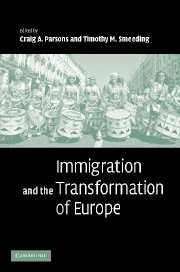Book contents
- Frontmatter
- Contents
- List of figures
- List of tables
- List of contributors
- Acknowledgements
- 1 What's unique about immigration in Europe?
- 2 Europe's immigration challenge in demographic perspective
- 3 Migration into OECD countries 1990–2000
- 4 Divergent patterns in immigrant earnings across European destinations
- 5 Economic consequences of immigration in Europe
- 6 Occupational status of immigrants in cross-national perspective: A multilevel analysis of seventeen Western societies
- 7 Immigrants, unemployment, and Europe's varying welfare regimes
- 8 How different are immigrants? A cross-country and cross-survey analysis of educational achievement
- 9 Immigration, education, and the Turkish second generation in five European nations: A comparative study
- 10 Managing transnational Islam: Muslims and the state in Western Europe
- 11 Migration mobility in European diasporic space
- 12 The new migratory Europe: Towards a proactive immigration policy?
- 13 European immigration in the people's court
- 14 The politics of immigration in France, Britain, and the United States: A transatlantic comparison
- 15 “Useful” Gastarbeiter, burdensome asylum seekers, and the second wave of welfare retrenchment: Exploring the nexus between migration and the welfare state
- 16 The European Union dimension: Supranational integration, free movement of persons, and immigration politics
- 17 The effectiveness of governments’ attempts to control unwanted migration
- Index
- References
14 - The politics of immigration in France, Britain, and the United States: A transatlantic comparison
Published online by Cambridge University Press: 23 June 2009
- Frontmatter
- Contents
- List of figures
- List of tables
- List of contributors
- Acknowledgements
- 1 What's unique about immigration in Europe?
- 2 Europe's immigration challenge in demographic perspective
- 3 Migration into OECD countries 1990–2000
- 4 Divergent patterns in immigrant earnings across European destinations
- 5 Economic consequences of immigration in Europe
- 6 Occupational status of immigrants in cross-national perspective: A multilevel analysis of seventeen Western societies
- 7 Immigrants, unemployment, and Europe's varying welfare regimes
- 8 How different are immigrants? A cross-country and cross-survey analysis of educational achievement
- 9 Immigration, education, and the Turkish second generation in five European nations: A comparative study
- 10 Managing transnational Islam: Muslims and the state in Western Europe
- 11 Migration mobility in European diasporic space
- 12 The new migratory Europe: Towards a proactive immigration policy?
- 13 European immigration in the people's court
- 14 The politics of immigration in France, Britain, and the United States: A transatlantic comparison
- 15 “Useful” Gastarbeiter, burdensome asylum seekers, and the second wave of welfare retrenchment: Exploring the nexus between migration and the welfare state
- 16 The European Union dimension: Supranational integration, free movement of persons, and immigration politics
- 17 The effectiveness of governments’ attempts to control unwanted migration
- Index
- References
Summary
Introduction: The problem
Both Europe and the United States are “countries” of immigration. Each year about 1.5 million immigrants legally enter the countries that comprise the European Union (the EU-15), with considerable variation among countries. A generation ago, the most important differences within Europe were between countries that had historically needed and received immigrants (France, Germany, Switzerland, and the United Kingdom), and those that had been the providers of immigrants (Italy, Spain, Ireland, and Portugal). Now, however, all of the senders are receivers, and the variation is among the levels of immigration. Indeed, Europe now receives between 4.7 immigrants per thousand population on the high end (1992) – 3.9 on the low end (2001), compared with about 3.8 per thousand in the United States (SOPEMI 2004: 305–10).
The most important differences between Europe and the United States are not those of levels of immigration, but differences in the politics of immigration: immigration policy and the dynamics that drive this policy. The United States has a relatively open immigration policy, one that sets a (flexible) ceiling on the number of legal immigrants admitted each year, the basis on which they are to be admitted, and the principle criteria that govern admission. Although the ceilings set on immigration never exactly correspond to the actual number of immigrants admitted to the United States each year, there is a general relationship between the intent of the law (to admit and limit immigrants) and the results.
- Type
- Chapter
- Information
- Immigration and the Transformation of Europe , pp. 362 - 392Publisher: Cambridge University PressPrint publication year: 2006
References
- 26
- Cited by



